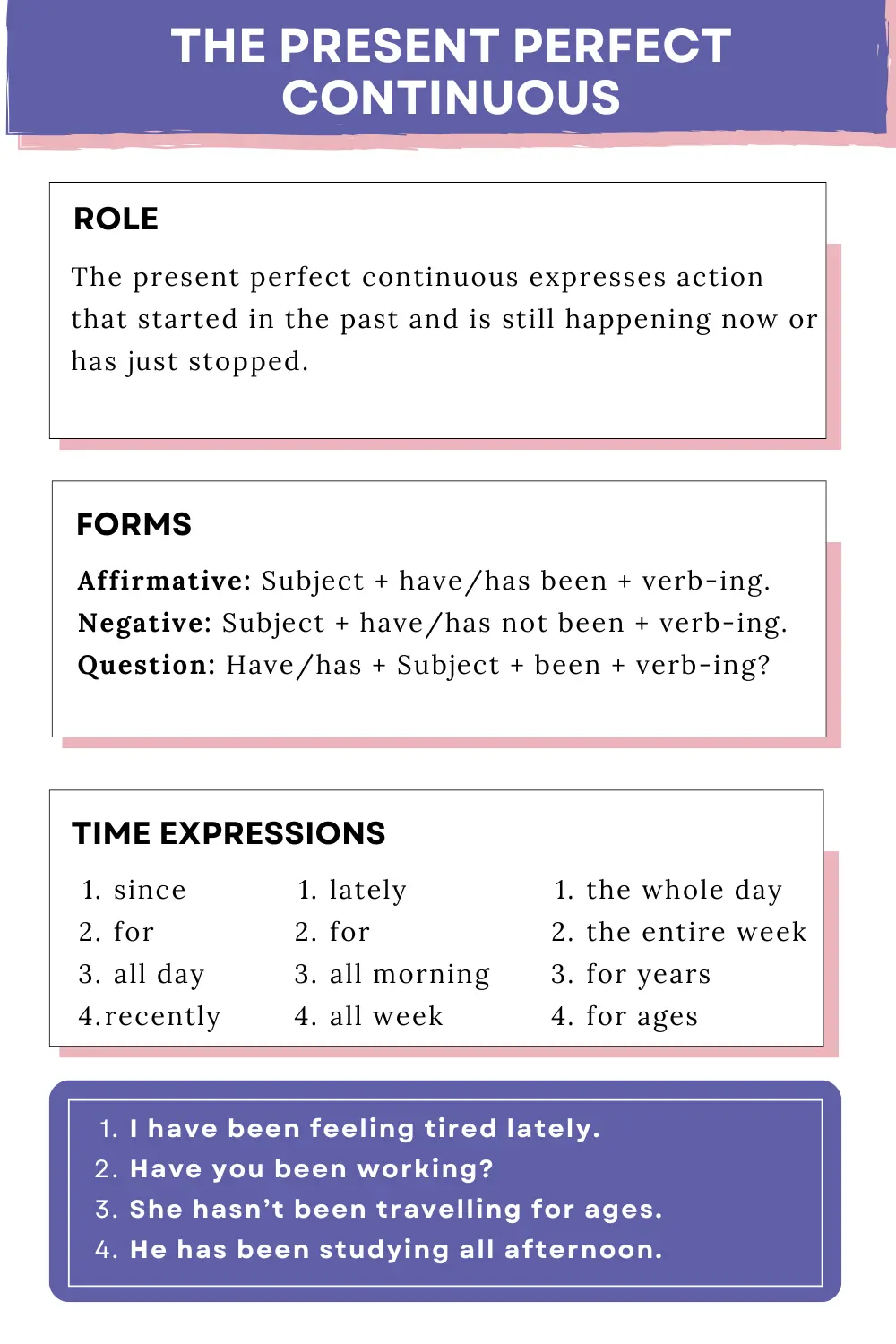The present perfect continuous expresses action that started in the past and is still happening now or has just finished.
Imagine you are sitting in the living room and your sister is at the table with books everywhere. She’s been there for hours. In this case, you can say:
- She has been studying all morning.
May be she started studying at 8 a.m. and she is still studying at the time of speaking.
Now imagine your friend walks into the room. He is breathing heavily, his face is red, and he is wiping sweat from his forehead. You can ask him:
- Have you been running?
Here, the action is already finished, but the effects are still visible because he is out of breath, sweaty, and tired. The result is happening now, even if the action has stopped.
Let us study another example. Suppose you walk into a room and notice that your sister has red, puffy eyes and there are tissues on the table. Her voice sounds shaky. You might say:
- Have you been crying?
She is not crying anymore, but you can tell she was. The evidence is still noticeable (watery eyes, sniffles, tissues).
1. Form of the present perfect continuous tense
| Form | Structure | Example |
|---|---|---|
| Affirmative | Subject + have/has + been + verb (-ing) | I have been waiting for you for three hours. |
| Negative | Subject + have/has + not + been + verb (-ing) | She has not been feeling well lately. |
| Interrogative | Have/has + subject + been + verb (-ing)? | Have you been sleeping? |
| Interrogative negative | Have/Has + subject + not + been + verb (-ing)? | Hasn’t he been attending the meetings? |
2. Use of the present perfect continuous tense
2.1 Activities that started in the past and are still ongoing
- It's been raining all day.
- I have been reading for the past hour, and my eyes are starting to feel fatigued.
- Let's take a little break now. We have been working for hours.
- He has been playing the guitar nonstop for the past few days, perfecting his skills.
- I have been waiting for this moment for so long, and it's finally here.
- I think the baby is not feeling well. She has been crying inconsolably.
- We have been planning this trip for months, and it is finally happening.
- I have been learning a new language for the past few months.
- They have been rehearsing for their upcoming play for the last two weeks.
In the above examples, notice that the duration of the action is often indicated by time expressions such as for the last few hours/days/weeks.
2.2 Recently finished activities
- Have you been drinking?
- You are sweating. Have you been running?
- He has been working hard, so he's tired.
- I have been working on this project for the past few weeks, and it's finally done now.
- Her eyes look tired. I think she has been watching TV again.
- Your eyes are a little red and swollen. Have you been crying?
- Where have you been? I have been playing football.
Remember that the present perfect continuous describes actions that began in the past and are still ongoing or have recently finished. It can be used with the following adverbs of frequency to express annoyance or criticism:
- always
- constantly
- continually
For example, consider the following:
- I have been working hard for the last few weeks.
- I have constantly been working hard for the last few weeks.
The first sentence implies that the person is currently working hard, and that this effort has continued over a certain period of time. The second sentence suggests continual effort as well, but the use of constantly may carry a tone of criticism or frustration, depending on the context.
3. Present perfect continuous vs present perfect simple
Students often confuse the present perfect continuous and the present perfect simple. While both are used to talk about actions or states that began in the past and continue into the present, there is a key difference:
- The present perfect continuous emphasises the duration of the action.
- The present perfect simple focuses on the completion or result of the action.
Compare the following examples:
- They have been repairing the heating system since this morning. (ongoing action)
- They have repaired the heating system. (completed action)
Note, though, that in some situations, either form can be used without changing the meaning:
- I have been working here for 10 years.
- I have worked here for 10 years.
4. Notes on verbs of mental process
Verbs of mental process describe cognitive mental actions, such as think, believe, know, like, and understand. They are typically stative verbs and should not be used in present perfect continuous. An exception is the verb think.
- ✓ I have always liked the way you teach. ✗ Incorrect: I have always been liking the way you teach.
- ✓ Have you heard the news? ✗ Incorrect: Have you been hearing the news?
- ✓ I have understood you. ✗ Incorrect: I have been understanding you.
- ✓ I have been thinking about you.

To test if you have understood the lesson, check this present perfect continuous tense worksheet.
